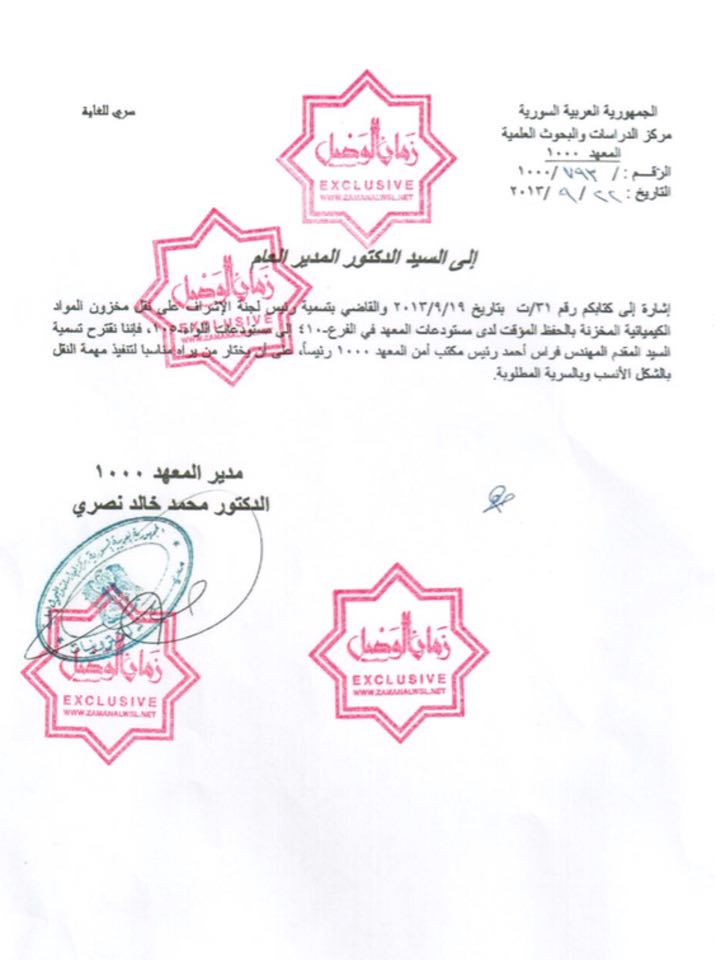France has issued an international arrest warrant for Syrian President Bashar al-Assad, accused of complicity in crimes against humanity over chemical attacks in 2013, a judicial source and plaintiffs in the case said Wednesday. The judicial source told AFP Assad was also suspected of complicity in war crimes for the attacks, blamed by the opposition on the regime, that killed more than 1,400 people near Damascus in August 2013. International warrants were also issued for the arrests of Assad's brother Maher, the de-facto chief of a Syrian elite military unit, and two armed forces generals. The Paris court's unit concerned with crimes against humanity has been investigating the chemical attacks since 2021. The probe followed a legal complaint filed by the Syrian Centre for Media and Freedom of Expression (SCM) NGO, lawyers' association Open Society Justice Initiative (OSJI) and the Syrian Archive, a body documenting human rights violations in Syria Zaman al-Wasl played a role in providing the international human rights organizations that supervised this case with information regarding the file of war crimes involving chemical weapons. In addition to Bashar al-Assad and his brother Maher, the commander of the Fourth Division in the regime’s army, the arrest warrants target two other brigadier generals: Ghassan Abbas, director of Branch 450 of the Syrian Scientific Studies and Research Center, and Bassam al-Hassan, advisor to the President of the Republic for strategic affairs and liaison officer between the presidential palace and the Scientific Research Center. Among the documents is an official document proving that Bashar al-Assad's regime still possesses a stockpile of dangerous military chemicals. In July 2017, Zaman al-Wasl obtained the official document that revealed how the Syrian regime had transferred most of chemical weapons stockpiles in 2013 to secret depots held by Maher al-Assad, after the deadly Sarin gas attack on Eastern Ghouta suburbs. Moving most of the chemical arsenal from the Institute 1000 in Jamraya to 105th Brigade near the Presidential Palace in Damascus was on September 19, 2013 at the same day the regime handed the UN Organization for the Prohibition of Chemical Weapons (OPCW) a list of chemical sites in the war-torn country, following the Eastern Ghouta Chemical attack on August 21, 2013 when more than 1460 died in the nerve gas attack, two weeks before the arrival of the United Nations inspectors on October 3. The document reveals the Assad regime's manipulation of the issue of handing over its entire stock of chemical weapons, a few days before the arrival of UN experts to begin the steps to disarm the regime's chemicals, in implementation of a Russian-American deal concluded between the two parties, and which was framed in a binding UN resolution bearing the number 2118. The document consists of a book issued by Institute 1000 in Jamraya (Damascus countryside), signed by its director, Dr. Muhammad Khaled Nasri, and addressed to the General Director of the Center for Scientific Studies and Research. The document comes in response to a previous letter, in which the Director General of the Center ordered the nomination of the “Chairman of the Supervisory Committee” for the process of transferring the stock of chemical materials deposited at the Institute “1000” to the warehouses of the 105th Brigade, which is the most famous and dangerous brigade of the Republican Guard, which is responsible for protecting Bashar al-Assad and guarding his palaces. . In his document, Nasri proposes naming “Lieutenant Colonel Engineer Firas Ahmed, Head of the Institute’s Security Office 1000,” as head of the committee supervising the transfer of chemical stock. Lieutenant Colonel Ahmed had the authority to choose whomever seems appropriate to carry out the transfer mission in the most appropriate manner and with the required confidentiality.” This was not the only case that the Zaman al-Wasl contributed to, according to editor-in-chief Fathi Bayoud, who revealed that the Syrian news site had a role in revealing information about more than 15 cases proving the regime’s involvement in war crimes against the Syrians, as it provided international human rights organizations with information and evidence. Influential in this regard, the most important of which were crimes committed by the Assad regime using chemical weapons.
What is Zaman Al-Wasl contribution to France's arrest warrant against Bashar Al-Assad?
















Comments About This Article
Please fill the fields below.